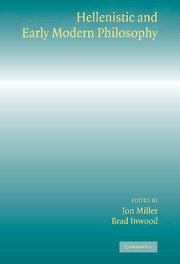Book contents
- Frontmatter
- Contents
- List of Abbreviations
- Notes on Contributors
- Preface
- Introduction
- 1 Stoicism in the Philosophical Tradition
- 2 Early Modern Uses of Hellenistic Philosophy
- 3 Locke's Offices
- 4 Patience sans Espérance: Leibniz's Critique of Stoicism
- 5 Epicureanism in Early Modern Philosophy
- 6 Stoics, Grotius, and Spinoza on Moral Deliberation
- 7 The Discourse on the Method and the Tradition of Intellectual Autobiography
- 8 Subjectivity, Ancient and Modern
- 9 Spinoza and Philo
- 10 Hume's Scepticism and Ancient Scepticisms
- 11 Stoic Naturalism in Butler
- Bibliography of Primary Sources
- Bibliography of Secondary Sources
- Index (general)
- Index (of selected text passages)
4 - Patience sans Espérance: Leibniz's Critique of Stoicism
Published online by Cambridge University Press: 05 August 2012
- Frontmatter
- Contents
- List of Abbreviations
- Notes on Contributors
- Preface
- Introduction
- 1 Stoicism in the Philosophical Tradition
- 2 Early Modern Uses of Hellenistic Philosophy
- 3 Locke's Offices
- 4 Patience sans Espérance: Leibniz's Critique of Stoicism
- 5 Epicureanism in Early Modern Philosophy
- 6 Stoics, Grotius, and Spinoza on Moral Deliberation
- 7 The Discourse on the Method and the Tradition of Intellectual Autobiography
- 8 Subjectivity, Ancient and Modern
- 9 Spinoza and Philo
- 10 Hume's Scepticism and Ancient Scepticisms
- 11 Stoic Naturalism in Butler
- Bibliography of Primary Sources
- Bibliography of Secondary Sources
- Index (general)
- Index (of selected text passages)
Summary
Stoicism casts a long shadow over early modern moral philosophy. In the late sixteenth century, the efforts of Justus Lipsius and Guillaume Du Vair to formulate a coherent Christian Neostoicism sparked a succession of works aimed at assimilating, or rebutting, central claims of Stoic ethical theory. The impact of Stoicism on the major figures of seventeenth-century philosophy, particularly those of the second half of the century, takes a more subtle form. Among these thinkers, there is little interest in confronting Stoic views directly, either to refute them or defend them. Yet Stoicism makes a vital contribution to the ethical theories of a number of later early modern philosophers, including, most prominently, Descartes, Spinoza, and Leibniz. The theories of these three philosophers differ significantly in their details and in their proximity to Stoic orthodoxy, yet each involves a creative appropriation of Stoic ideas.
A growing body of literature relates the ethical views of Descartes and Spinoza to those of the Stoics. Much less has been written about the Stoic background to Leibniz's ethics. In one sense, this is unsurprising, since it is difficult to extract a systematic ethical theory from Leibniz's fragmentary writings. At the same time, the case demands attention, for Leibniz confronts more directly, and more critically, than Descartes or Spinoza the ramifications of Stoicism for morality, and does so in part by identifying his rationalist predecessors as the modern inheritors of the mantle of Stoicism.
- Type
- Chapter
- Information
- Hellenistic and Early Modern Philosophy , pp. 62 - 89Publisher: Cambridge University PressPrint publication year: 2003
- 5
- Cited by



